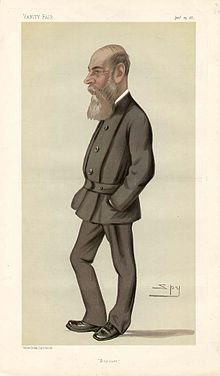
Back تشارلز بويكوت Arabic تشارلز بويكوت ARZ Charles Boycott Catalan Charles Cunningham Boycott German Τσαρλς Μπόικοτ Greek Charles Cunningham Boycott Spanish Charles Boycott Finnish Charles Cunningham Boycott French Charles Boycott Irish Charles Boycott ID
Charles Boycott | |
|---|---|
 Boycott as caricatured by Spy (Leslie Ward) in Vanity Fair, January 1881 | |
| Born | Charles Cunningham Boycatt 12 March 1832[citation needed] Burgh St Peter, Norfolk, England |
| Died | 19 June 1897 (aged 65) |
| Resting place | Burgh St Peter |
| Occupations |
|
| Employers | |
| Opponent | Irish National Land League |
| Spouse |
Anne Boycott (m. 1852) |
Charles Cunningham Boycott (12 March 1832 – 19 June 1897) was an English land agent whose ostracism by his local community in Ireland gave the English language the term boycott. He had served in the British Army 39th Foot, which brought him to Ireland. After retiring from the army, Boycott worked as a land agent for Lord Erne, a landowner in the Lough Mask area of County Mayo.[1]
In 1880, as part of its campaign for the Three Fs (fair rent, fixity of tenure, and free sale) and specifically in resistance to proposed evictions on the estate, local activists of the Irish National Land League encouraged Boycott's employees (including the seasonal workers required to harvest the crops on Lord Erne's estate) to withdraw their labour, and began a campaign of isolation against Boycott in the local community. This campaign included shops in nearby Ballinrobe refusing to serve him, and the withdrawal of services. Some were threatened with violence to ensure compliance.
Opposition to the campaign against Boycott became a cause célèbre in the British press after he wrote a letter to The Times. Newspapers sent correspondents to the West of Ireland to highlight what they viewed as the victimisation of a servant of a peer of the realm by Irish nationalists. Fifty Orangemen from County Cavan and County Monaghan travelled to Lord Erne's estate to harvest the crops, while a regiment of the 19th Royal Hussars and more than 1,000 men of the Royal Irish Constabulary (RIC) were deployed to protect the harvesters. The episode was estimated to have cost the British government and others at least £10,000 to harvest about £500 worth of crops.
Boycott left Ireland on 1 December 1880, and in 1886, became land agent for Hugh Adair's Flixton estate in Suffolk. He died at the age of 65 on 19 June 1897 in his home in Flixton, after an illness earlier that year.
- ^ "Captain Charles Boycott". Keep Military Museum. Archived from the original on 11 November 2013. Retrieved 4 July 2010.